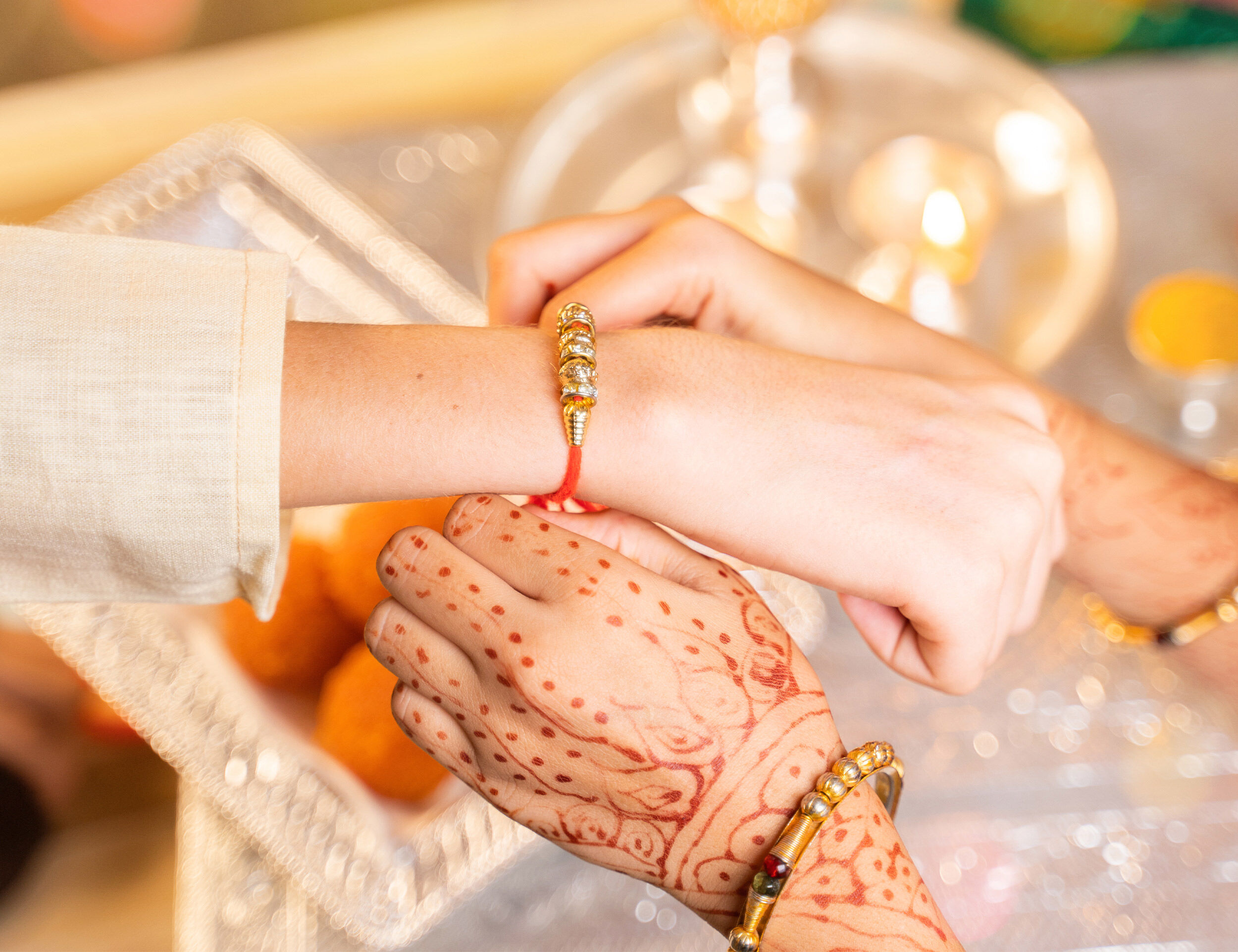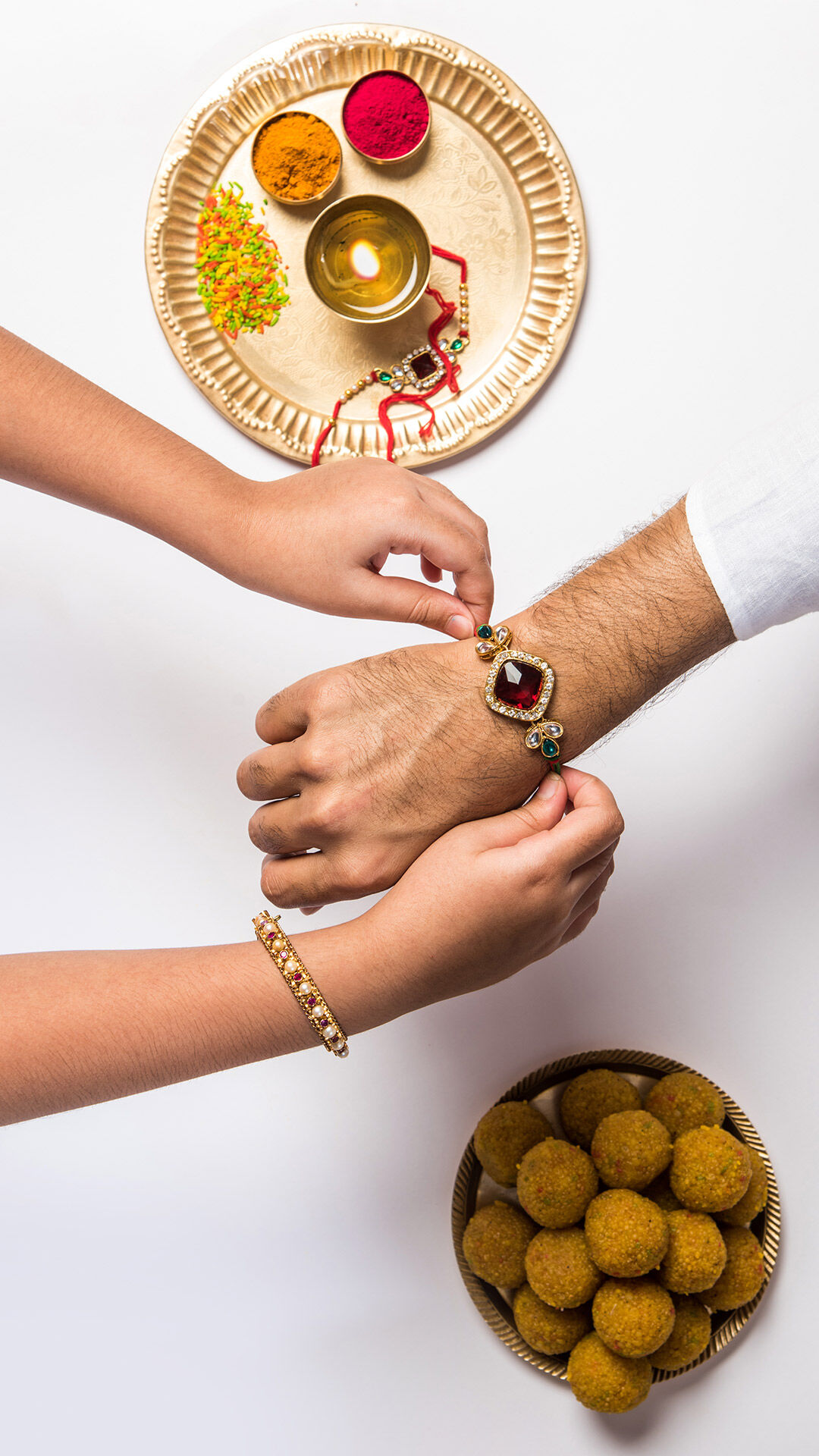STORIES BY DIWAS

Lifestyle
Rakhi Season Unwrapped: Understanding the Significance of Raksha Bandhan
Date 14 July 2025 Reading time: 7-10 mins
Raksha Bandhan, fondly known as Rakhi, stands as one of India’s most treasured festivals, a celebration that transcends time to honour the sacred bond between siblings. As families across the globe prepare to mark this occasion, the festival continues to symbolise the promise of protection and the enduring love that defines sibling relationships.
The significance of Raksha Bandhan lies not merely in its rituals but in the profound emotional and cultural resonance it carries. Observed on the full moon day of the Hindu month of Shravana, this tradition brings siblings together—whether in bustling Indian towns or far-flung diaspora communities—to reaffirm their commitment to one another.
As we delve into this timeless celebration, we uncover its rich history, evolving rituals, and universal appeal that make it a cherished event even in the modern age.
Understanding the Spiritual Significance of Raksha Bandhan
The importance of Raksha Bandhan is woven into the fabric of Indian heritage, reflecting a deep-seated value of protection and familial duty. Deriving its name from the Sanskrit terms "Raksha" (protection) and "Bandhan" (bond), the festival encapsulates the essence of a sibling’s pledge to safeguard one another. Beyond the simple act of tying a rakhi, a decorative thread, it serves as a powerful reminder of the responsibilities and affection that siblings share, making it a cornerstone of cultural identity in India and beyond.
Historical Background of Raksha Bandhan
The roots of Raksha Bandhan stretch back millennia, with its significance illuminated through ancient tales and historical events. One of the most enduring stories comes from the Mahabharata, where Draupadi, in an act of compassion, tied a piece of her saree around Lord Krishna’s injured wrist. In gratitude, Krishna vowed to protect her, a promise fulfilled when he shielded her honour later in the epic. This narrative underscores the spiritual significance of Raksha Bandhan, portraying the rakhi as a symbol of divine safeguarding.
History also records instances where the festival transcended familial ties. In the 16th century, Rani Karnavati of Mewar sent a rakhi to Emperor Humayun, seeking his aid against an invasion. Moved by the gesture, Humayun responded, highlighting how Raksha Bandhan fostered alliances rooted in protection. These accounts reveal how the festival has evolved while retaining its core ethos, adapting to societal shifts yet preserving its foundational values.
The Significance of Raksha Bandhan Rituals and Traditions
The rituals of Raksha Bandhan are both elegant and meaningful, bringing the importance of Raksha Bandhan to life through time-honoured customs. Sisters prepare a thali adorned with a rakhi, roli, rice, sweets, and a lit diya, performing an aarti to bless their brothers before tying the sacred thread on their wrists.
Brothers, in turn, offer gifts and pledge their protection, a mutual exchange that strengthens their bond. These practices, observed with reverence across households, vary regionally—some in Gujarat honour the sea deity Varuna, while others in Rajasthan extend prayers to the moon, yet they all echo the festival’s unifying theme of care and safeguarding.
The Significance of Raksha Bandhan in English Culture
While Raksha Bandhan originated in India, its influence has gracefully extended to English-speaking nations, particularly within the Indian diaspora. The importance of Raksha Bandhan in these contexts lies in its ability to preserve cultural roots while fostering cross-cultural appreciation, making it a bridge between diverse communities.
How Raksha Bandhan is Celebrated in English Culture
In countries such as the United Kingdom, the United States, Canada, and Australia, Raksha Bandhan is celebrated with fervour among Indian families and beyond. Community centres host events featuring rakhi-tying ceremonies, cultural performances, and shared feasts, reflecting the festival’s joyous spirit.
Technology enhances these celebrations, with virtual ceremonies connecting siblings across continents via video calls and e-rakhis. Increasingly, non-Indian participants join in, drawn by the universal appeal of protection and love, a testament to the significance of Raksha Bandhan as a globally resonant tradition.
The Impact of Raksha Bandhan on English-Indian Relationships
Raksha Bandhan has become a catalyst for strengthening ties between English and Indian communities, embodying the significance of Raksha Bandhan in promoting mutual understanding. In multicultural societies, the festival offers a window into Indian values, encouraging participation from diverse groups.
Initiatives such as tying rakhis to frontline workers or community leaders in English-speaking regions honour their protective roles, echoing the festival’s ethos. This cultural exchange not only enriches relationships but also builds inclusive communities, showcasing the festival’s adaptability and relevance in a globalised world.
The Meaning of Raksha Bandhan: A Deeper Look
Beyond its outward celebrations, Raksha Bandhan carries a profound meaning that speaks to the heart of human connection, offering insights into its enduring appeal.
Symbolism in Raksha Bandhan
The rakhi, though a simple thread, is imbued with deep symbolism. It represents an unbreakable bond, a tangible promise of protection and support between siblings. The act of tying it, accompanied by prayers for well-being, reflects the spiritual significance of Raksha Bandhan, invoking blessings and divine favour. In a broader sense, the rakhi symbolises duty and loyalty, extending its meaning beyond family to encompass communal care—an idea that resonates strongly in today’s interconnected society.
Raksha Bandhan: A Celebration of Protection and Love
At its essence, Raksha Bandhan is a heartfelt celebration of the love and protection siblings offer each other. It honours the sacrifices made, the trust shared, and the resilience of familial ties in the face of life’s challenges.
As families navigate a fast-paced world, the festival serves as a poignant reminder to pause and cherish these relationships. The significance of Raksha Bandhan shines through in its ability to reinforce values of compassion and responsibility, making it a beacon of hope and unity.
Honouring the Thread That Connects Us Across Time
As Raksha Bandhan approaches, it invites us to reflect on its timeless significance of Raksha Bandhan—a celebration that transcends borders to honour the bond of protection. This festival is a testament to the enduring power of love, duty, and familial strength.
Whether observed through ceremonies in India or innovative expressions abroad, Raksha Bandhan continues to unite people. In a world of constant change, its message remains steadfast: the promise of protection and the joy of connection are worth celebrating, today and always.
This Rakhi season, dress up in something special, perhaps a stylish kurta from the festive collection of Diwas, prepare your thali with care, and embrace the timeless tradition that has connected generations of siblings across millennia.



